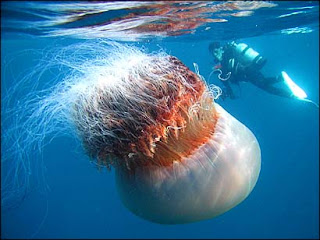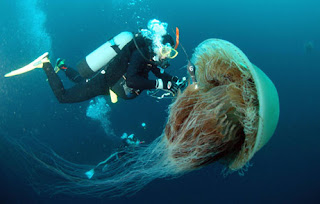
Japanese fisherman and power plants have been under siege over the last year by giant jellyfish. While the cause of the swarming is unknown, the nuisance is severe. Growing to almost 500lbs, Nemopelima nomurai destroys fishing nets and poisons fish when trapped in nets. Their smaller brethren, the moon jellies, have been blocking intake vents for seaside power plants. In an effort to find an economic solution to this problem, the Japanese have developed both a baking powder and a crunchy, delicious salted snack derived from the gelatinous monsters. Although these inventions have yet to be commercial success stories, the scientists may have finally struck gold in the form of mucin. Mucin, a main ingredient in saliva and mucus, was recently discovered in the jellyfish "quite by accident" while researchers were searching for other compounds. The fact that it took researchers this long to realize that jellyfish were in fact enormous floating mucus bags might be the more remarkable revelation here. One use of mucin is as an emulsifier in cosmetics. Tony Corfield of the University of Bristol, a mucin biologist, cautioned that more tests need to be performed to ensure that jellyfish mucin does not provoke allergic reactions when applied to human faces... Tune in next week when we interview Tony Corfield, for an insider's perspective on the illustrious life of a mucin biologist.

Japanese scientists examining a giant jelly for "deliciousness"






evden eve nakliyat
bursaevden eve nakliyat